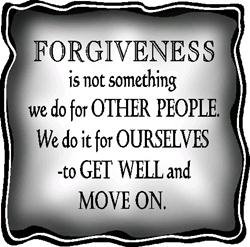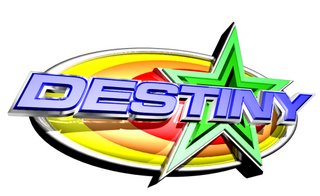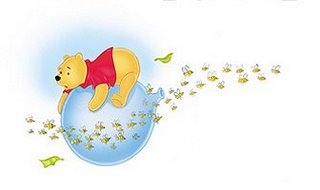Yin and Yang and Chaotic Pooh
 "Forgiving your flaws and failures does not mean looking away from them or lying about them. Look at them as a string of pitiful or menacing hitchikers whom you can't afford not to pick up on your journey to a changed life. Each one of them has a piece of the map you need hidden in its shabby clothing. You must listen attentively to all their stories and win the friendship of each one to put your map together. Where you are going --- into a forgiven life of wholeness, passion and commitment --- you will need all the peculiar denizens of your dark side working diligently on your behalf."
"Forgiving your flaws and failures does not mean looking away from them or lying about them. Look at them as a string of pitiful or menacing hitchikers whom you can't afford not to pick up on your journey to a changed life. Each one of them has a piece of the map you need hidden in its shabby clothing. You must listen attentively to all their stories and win the friendship of each one to put your map together. Where you are going --- into a forgiven life of wholeness, passion and commitment --- you will need all the peculiar denizens of your dark side working diligently on your behalf."
- from 'A Little Book of Forgiveness: Challenges and Meditations for Anyone With Something to Forgive', by D. Patrick Miller. "Before you were born, God planned this moment in your life. It is no accident that you are holding this book. God longs for you to discover the life he created you to live --- here on earth, and forever in eternity."
"Before you were born, God planned this moment in your life. It is no accident that you are holding this book. God longs for you to discover the life he created you to live --- here on earth, and forever in eternity."
- from 'The Purpose Driven Life' by Rick Warren. "When it comes to human history, we're making it up as we go along, and we don't always get it right...I have come to believe that a life enslaved to a single Goal, no matter how noble, becomes a mechanism rather than an organism, a business plan rather than a biography, a tool rather than a gift. You feel that if only you could find the purpose of your life you could escape the confusion of aimlessness. But when you try to identify the use of your entire life, you are asking to be used."
"When it comes to human history, we're making it up as we go along, and we don't always get it right...I have come to believe that a life enslaved to a single Goal, no matter how noble, becomes a mechanism rather than an organism, a business plan rather than a biography, a tool rather than a gift. You feel that if only you could find the purpose of your life you could escape the confusion of aimlessness. But when you try to identify the use of your entire life, you are asking to be used."
- from 'Living Without a Goal' by James Ogilvy.
"The first chaos theorists, the scientists who set the discipline in motion, shared certain sensibilities. They had an eye for pattern, especially pattern that appeared on different scales at the same time. Believers in chaos ... speculate about determinism and free will, about evolution, about the nature of conscious intelligence. They feel that they are turning back a trend in science toward reductionism, the analysis of systems in terms of their constituent parts: quarks, chromosomes or neurons. They believe that they are looking for the whole."
- from 'Chaos - Making a New Science' by James Gleick. "What's that you're writing?" asked Pooh, climbing onto the writing table.
"What's that you're writing?" asked Pooh, climbing onto the writing table.
"The Tao of Pooh," I replied.
"The how of Pooh?" asked Pooh, smudging one of the words I had just written.
"The Tao of Pooh," I replied, poking his paw away with my pencil.
"It seems more like the ow! of Pooh," said Pooh, rubbing his paw.
"Well, it's not," I replied huffily.
"What's it about?" asked Pooh, leaning forward and smearing another word.
"It's about how to stay happy and calm under all circumstances!" I yelled.
"Have you read it?" asked Pooh.
- from 'The Tao of Pooh' by Benjamin Hoff
Reference links for this blog:
The 5 tenets - Common Universal Pattern aka 'is'
The broken circle's place in 'is'
The syntax of 'is'
Most of my extrication of records, books and other assorted collectibles have made their way into the realm of daylight (now sitting in partially-unpacked boxes in a more cluttered basement), but the records and books are mostly safely back on shelves, dusted off and ready to be selected from the others for momentary attention.
Of the several hundred books, I have selected about 50 which found their way to the shelf over my bed...sort of my personal best-sellers list if you will. Last night, I started reading five books, selected for interest from this shortlist, but also for hopefully apparent contradictions in substance. I'm hoping these books will dialogue with each other as I randomly read bits and parts and farts and starts from each, and eavesdrop on the "Dinner With Andre" conversation moments I hope will ensue as they 'talk' ideas with each other.
As you might have gathered from my previous post, I'm belly-button gazing again (still?). Woe is me, what is life all about, and why shouldn't I just play? Don't I need to pay? For something, anything? I've spent the first half of my life earning my living, now shouldn't I be learning my living? At the moment, my answer is 'yes' and 'no'. We are not mono-purpose individuals (although using a word like 'individual' to describe our complexities may sound like an oxymoron in this context).
'is' is a hobby, a fascination, a passion, a game, a truth, a theory, an absolute, a challenge, an obsession, a frivolity, and so much more for me. As I apply my thoughts to it, I am creating who I am as I see myself. Does an art critic view a masterpiece through the same eyes as the artist? Does the 'Studies in Chaucerian Literature' student derive the same messages that the author intended to convey centuries earlier, in a different time, place and circumstance? Should either care?
When I read a book, which is more significant to me, my interpretation and derived meaning from what is written, or the authors drive and intent for writing it in the first place? Is the process of attempting to figure out the writer's motivation for writing a particular book part of the message and essence of the book itself? As is pointed out in "Living Without A Goal", an engineer is constrained to draw plans that will meet standards and safety, whereas an artist is free to play, unrestrained by such needs.
And so all of that is foreplay, and I suppose to some degree, justification, for me to continue unfolding 'is', this time with a world-wide exercise in evolving the language, as I alluded to in my previous post.
If I send you back to the very first summary of 'is', and its spinoff B.A.T. in this blog of Jan 22, you will see that, next to the base level(0) of the theory, is the principle level(1) comprised of issues dealing with ETHICS, CONSCIENCE, MORALS, and PRINCIPLES. It is now time to establish what those details are. I intend to use a technique similar to Googlewhacking and use the internet and all its citizens as my laboratory.
I have made up a list of 100 semi-arbitrary words that might belong formally or loosely in this level. I've developed a process to fine-tune and interact with sites dealing with these issues, just as Mr. Googlewhack himelf did, although without the international globe-trotting aspect! A week or two ago, I mused over running the TV reality show "Survivor" in reverse, where you start with a society of one, and invite necessary others into the society, building it from the ground up (or, I'd prefer to say, from level(0) up) within both the context and the reality of the on-going existing global society that we have today.
We'll see how it turns out. I have set some rules (just as were set down for Dave Gorman in his Googlewhacking crusade), and I shall lay them down with the first go-round of words in the next post. That's not to say they're irrevocable or immutable, for within 'is' everything belongs, so no mere rule can exclude anything. TOLERANCE of all is ground(0).
The goal of this next phase, then, will be to find words that have the MOST hits, representing wide universal awareness, if not agreement, on a word or word-pair. Remember, the whole idea behind B.A.T. is to evolve a mechanism that allows agreement to grow where it does not yet exist, in a mutually-agreeable way. Looking for the win-win scenario, always.
Everyone is individual, unique, and worthy.
Fundamentally.
FUN-da-MENTAL-ALLY. (Playtime, thinking, friend).
What's in a word? Word PLAY.
PEACE - a game called 'Word peace' from Chronic Logic, based on forming words in three directions (see previous blog for a discussion on the pattern of three's).
"I've learned that some money costs too much." - age 51












In Bauhaus architecture, form follows function. There is a union of art and engineering. That's a notion that has always intrigued me. Coincidentally, the central library in downtown Washington was designed by one of the leading exponents of "form follows function," Mies van der Rohe. The city is thinking of tearing it down. Pity.
Posted by My Daily Struggles |
10:13 a.m.
My Daily Struggles |
10:13 a.m.
Also, your comment: "Is the process of attempting to figure out the writer's motivation for writing a particular book part of the message and essence of the book itself?"
Students of creativitty say that each great work of art is a meditation on how the work came into being--the motivation of the artist is, according to this theory an essential aspect of all great art.
What runs through your thinking is the need to unify, as in "manifest content of the message" and "motivation in communicating the message." Your intellectual struggles and concerns are preeminently those of a creative mind.
Posted by My Daily Struggles |
10:19 a.m.
My Daily Struggles |
10:19 a.m.
Which, in my apparently creative mind, begs the question "If a creative mind is driven by both style and substance, does it take a creative mind to recognize another one, or is the 'external view' of the singular existence of a complex multi-layered mind obvious to anyone looking to label it?"
If the latter is the case, should I then be able to recognize myself as creative, or has been the case with me, have I had to be told it often enough throughout my life that I just start to believe that others perceive me that way?
And does that now make it fact for me, or does it remain but an outside, appreciated and accepted observation and opinion?
Am I now creatively struggling with the motivation behind your posting of the comments, or carrying a simple observation to the extreme of either the sublime or the ridiculous?
Is there, can there be, any end to the spiral of questions I'm currently asking, other than me simply arbitrarily deciding to stop asking the next one?
Could this line of question-breeds-question be a root of a 'mental illness' such as bipolarism?
I wonder these types of things, but usually not out loud!
R.
Posted by Evydense |
11:58 a.m.
Evydense |
11:58 a.m.
Don't take this the wrong way, Rick, but I think some of your personality quirks are not attributable to bi-polar disorder, but to an obsessive-compulsive trend. I think creative people are more finely attuned to creative aspects of other people. Non-creative types often seem blind to creative features in others' personality. At the risk of mixing up concepts to the point of obscurity, I found it interesting yesterday, after taking a personality test on the internet, that I showed a Very High Obsessive-Compulsive reading. Maybe like-minded people, whether creative or obsessive, are more sensitive to the existence of similar traits in others. As to your own lack of awareness of your creativity, I'm at a loss. Maybe you're too humble to recognize your gifts.
Posted by My Daily Struggles |
12:32 p.m.
My Daily Struggles |
12:32 p.m.
Post a Comment